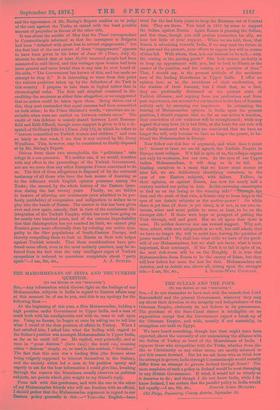THE MAHOMMEDANS OF INDIA AND THE TURKISH QUESTION.
[TO THE EDITI38 OF THE "SPECTATOR."]
Sra,—Any information which throws light on the feelings of our Muhammadan subjects in India in regard to Eastern affairs may at this moment be of use to you, and this is my apology for the following lines :- At the beginning of this year, a Shia Muhammadan, holding a high position under Government in Upper India, and a man of mark both with his coreligionists and with us, came to call upon me. Using no finesse, he began at once by asking me to tell him what I could of the then position of affairs in Turkey. When I had satisfied him, I asked him what the feeling with regard to the Sultan's position was amongst Muhammadans in Upper India, so far as he could tell me. He replied, very pointedly, and at once in "great distress" (bara runj); the wm.d runj meaning either " distress " simply, or, as used in this context, " irritation." The fact that this man was a leading Shia (the Soonee alone being vulgarly supposed to interest themselves in the Sultan), and the anxiety which led a man in his position openly and eagerly to ask for the best information I could give him, breaking through the reserve the Musalman usually observes on political subjects, are points which give weight to my friend's reply.
From talk with this gentleman, and with the one or the other of my Muhammadan friends who will use freedom with an official, I should gather that the Muhammadan argument in regard to our
Eastern policy generally is this You—the English—have tried for the last forty years to keep the Russians out of Central Asia. They are there. You tried in 1854 by arms to support the Sultan against Russia. Again Russia is pressing the Sultan, and this time, though you still profess yourselves his ally, we hear but little of your support. When we are told, then, that Russia is advancing towards India, if we may read the future in the past and the present, your efforts to oppose her will in course of time fail. With whom, then, is it our interest to be well,—with the coming or the parting guest? Our best course probably is to keep up appearances with you, but to look to Russia as the master of the position, and her coming as a question of time." That, I should say, is the present attitude of the moderate men of the leading Musulmans in Upper India. I offer no opinion here as to the soundness of their moderation, or the wisdom of their forecast, but I think that, as a fact, they are profoundly distressed at the present state of Turkish dilemma ; and arguing from our professions and from past experiences, can account for our inaction in the face of Russian activity only by assuming our impotence. In estimating the bearing of Muhammadan opinion in India upon the present position, I should suppose that so far as our action is inaction, their conviction of our weakness will be strengthened ; while any regard they may have (it is but little, at the best) for our rule will be vitally weakened when they are convinced that we have no longer the will, only because we have no longer the power, to be- friend the Muhammadan in Europe.
Now follow out this line of argument, and What does it point to ? Sooner or later, we are all agreed, the Turkish Empire in Europe must collapse. If it fall in spite of us, the collapse argues not only its weakness, but our own. In the eyes of our Upper Indian Mohammedans, it will drag us in its fall. In binding ourselves to a cause that we know must sooner or later fail, we are deliberately identifying ourselves, in the eyes of our Eastern subjects, with failure. Failure, in their opinion, as against Russia, has now for nearly half a century marked our policy in Asia. Is this crowning catastrophe to find us on the losing or the winning siar?--Tirrern Ie dust and the crash of that ruin, is Russia only to loom large in the ----- eyes of our Asiatic subjects as the motive-power ? Or while there is yet time (if there is yet time), is it not, in our own in- terests, wiser and more politic to seem, at least, to be on the stronger side? If there were hope or prospect of pulling the Turk through, well and good. But we all agree that there is none. He neither deserves nor can reward support. Why not, then, admit, with such safeguards as we will, but still admit, that we have no longer the will to assist him, leaving the question of power unsolved ? We shall lose what trifle we have of the good- will of our Muhammadans, but we shall not incur, what is more important, their contempt. If the Turk is to fall in spite of us, the next sick-room will be on the Hooghly. It is true that Muhammadans deem Russia to be the enemy of Islam, but they will bow before her none the less for that. Muhammadans are Asiatics, and as Asiatic are, above all, strong upon the stronger






























 Previous page
Previous page